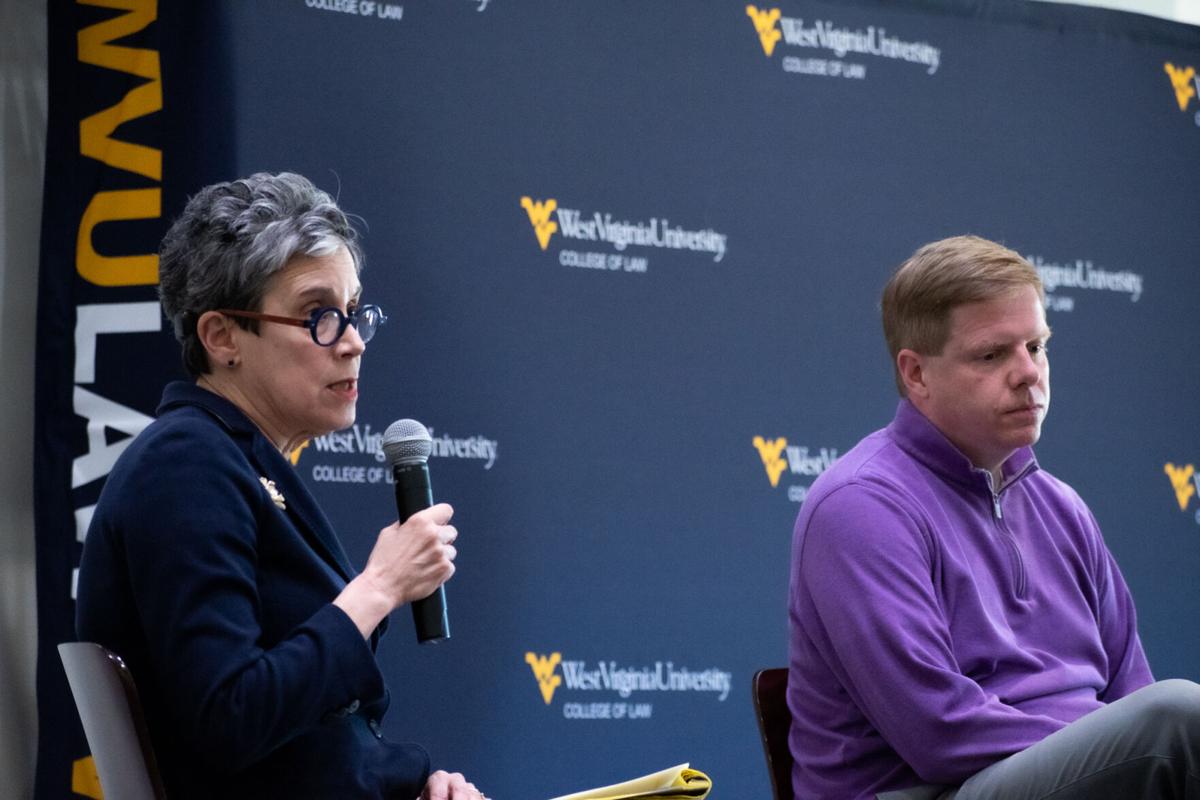Faculty were faced with opposition during a faculty senate meeting Monday after asking about administrative pay and position reductions. Administrators asserted that decreases in administrative salary could “devastate morale.”
West Virginia University is currently facing a $45 million budget deficit. Administrators have responded by issuing a Reduction in Force for faculty and staff and a transformation and reduction of programs.
Some faculty commented on administrators’ tones when addressing the incoming faculty and staff Reduction in Force, noting that faculty feel similarly defensive about cuts to their own positions and salaries.
Many faculty addressed concerns about the absence of a review process for administrative units and positions during the Reduction in Force.
“If we’re going to be a smaller institution, which all of leadership says we are, and that’s a necessity, it seems that a very good analytical assessment of all of that infrastructure that reports to you also needs to be assessed in a systematic manner, unit-by-unit, to make sure it’s right-sized,” Frankie Tack, faculty senate chair-elect, said to administrators.
“What we’re asking about is whether administrators will be assessed for RIFs [Reduction in Force],” Rose Casey, assistant professor of English, said.
Still, Provost Maryanne Reed said that administrative units have already been experiencing cuts and have not been replacing positions over the last few years without informing the campus community.
This follows several assurances of transparency throughout the process by administrators and officials.
“I am telling you that some budget cuts were really shouldered primarily at the central level, and there was a lot done to space the academic enterprise,” Reed said. “I don’t think we talked about that. We just did it.”
Vice President of Strategic Initiatives Rob Alsop also assured faculty and staff that administrators would not require individuals to reduce their take-home pay during this time after a faculty member asked if they’ve considered salary caps.
The Daily Athenaeum asked Director of News Communications Shauna Johnson if administrators were considering pay cuts.
“To remain relevant in a highly competitive environment and support efforts to attract and retain top talent, WVU is committed to paying faculty and staff at all levels of the organization at market-competitive rates,” Johnson said in an email.
Despite this, Krista Bresock, teaching assistant professor of mathematics, noted that several faculty in her department, including herself, are experiencing reductions in their take-home pay because they are losing stipends that some were dependent on as part of their yearly salary.
She said that, along with losing some coordination stipends in the math department, leadership roles, such as lead instructors, who also received additional stipends on top of their salary, have also been cut.
“Cutting stipends and leadership positions is reducing take-home pay for many of these faculty members by anywhere between 5,000, 10,000 and some up to 20,000,” Bresock said. “That may not seem like a large number to administrators, but for faculty with base salaries under 50,000, this income reduction will have a dramatic effect on them and their families.”
She added that eliminating instructor positions could also negatively impact the way courses run and therefore negatively impact students.
Reed deflected these concerns and told Bresock that the decisions to cut stipends and positions were made by the college and not by administrators.
Amy Weislogel, associate professor of sedimentary geology, expressed reservations about the possible reduced quality of education offered and increasing financial inaccessibility that could be a result of the University’s transformation.
“Nobody is here for fame and fortune and riches. You know, we're all here for our dedication to being able to contribute our time and talent and effort to raising this state up, which has many needs, right,” she said.
Weislogel also mentioned that West Virginia has a low attainment rate of higher education degrees, and that, with the increasing financial barriers for students, this decline will only grow.
Alsop told faculty that advocating for more state funding has been difficult because of the school’s declining enrollment overall and, more specifically, of in-state students.
Victor Muciño, professor of mechanical and aerospace engineering, also called for administrators to take accountability for their part in the current financial crisis of the University. He emphasized that classroom and research activity is most important in universities, and that non-faculty are meant to provide support and guidance.
“What are the swift actions or consequences that will be conducted … of administrative malpractice that took place outside the classrooms and research laboratories,” he said.
However, Reed ensured that the current crisis wasn’t the sole fault of administrators.
“This is an actual structural deficit that has occurred not because money was mismanaged or there was malfeasance, but because we’ve had declines in enrollment, and we are facing future declines in enrollment,” Reed said.
“I don’t know how you could put that malfeasance or say that that’s malfeasance of someone in my position or finance moving forward,” Alsop said. “I don’t think you can put the inflation that has impacted this institution moving forward, and if this could be simply solved by me resigning and everybody blaming me, I would have already been out the door.”
Still, Muciño defended the faculty.
“The consequences are going to be carried heavily by faculty members, who have continued to support the mission of the University, who have continued to get programs accredited, who have continued to do research, but who are now being severely loaded with the burden of this situation that we have,” Muciño said.
Prior to Muciño’s address to administrators, Alsop assumed some responsibility for the ongoing deficit.
“I wish that I had been stronger earlier, to move things forward as an institution and put us in a better position,” Alsop said.
“I understand the frustration. I understand the fact that this seems sudden, I understand that this is going to hurt a lot of people … this is not just isolated to WVU,” Reed said.








 WVU's Independent Student Newspaper
WVU's Independent Student Newspaper